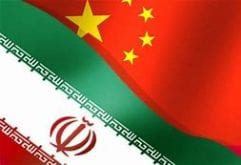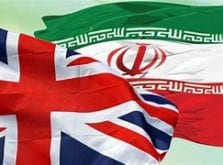Al-Monitor – Iran’s Foreign Ministry summoned the Russian and UK ambassadors in Tehran after a controversial photo showed the two sitting atop the steps of the Russian Embassy in central Tehran.
While the photo might not at first sight appear particularly provocative, to many Iranians it was an “insult” that reopened old wounds and stirred up anti-Russian and anti-British sentiments.
The 2021 photo showed three chairs, with Russian ambassador, Levan Dzhagaryan and his UK counterpart, Simon Shercliff sitting on the left and right, respectively, while the chair in between remained vacant. The very same setting exists in the iconic 1943 photo of Soviet leader Joseph Stalin, US President Franklin Roosevelt and UK Prime Minister Winston Churchill. What would have been the American chair in the 2021 photo is empty as the Washington holds no diplomatic relations with Tehran, and hence there is no US ambassador.
The three leaders were in the Iranian capital in 1943 at the height of the Second World War to attend the Tehran Conference, where an Allied nations agreement was inked for a second united front against Adolf Hitler’s Nazi Germany. Ever since, the Tehran Conference and the black-and-white photo taken during a time of Soviet and British occupation of Iran have served as a humiliating symbol of Iran’s manipulation at the hands of world powers.
“The Russian ambassador asserted that his intention behind posting the photo was merely to remember the Russian-British unity against the Nazi army,” the Iranian Foreign Ministry announced after summoning the Russian ambassador.
Only hours after the photo of the pair was tweeted by the Russian ambassador, Iranians of varying political leanings took to social media to vent their anger at what was seen as a “serious error of judgement,” with some calling for the two diplomats to be expelled.
Mohammad Javad Zarif, who is wrapping up his last days as Iran’s top diplomat inside the Foreign Ministry building that happens to be in the same area as the Russian and British embassies, came out to furiously describe the photo as “extremely inappropriate.”
“The Iranian people have shown … that their destiny can never be subject to decisions in foreign embassies or by foreign powers,” he wrote. And conservative parliament Speaker Mohammad Bagher Ghalibaf demanded a formal apology from the pair, urging the Foreign Ministry to take “firm action.”
The two ambassadors expressed no defiance after attending the Foreign Ministry summoning sessions. Yet they expressed no apologies either. The Russian ambassador addressed “the ambiguous” reactions to the photograph, saying, “It does not have an anti-Iranian context.” The same was retweeted by the UK ambassador, who began his new posting in Tehran only this week with a Persian-language video message to Iranians.
Iranian dissidents have long accused the Islamic Republic of compromising Iran’s interest by standing with the Russian Federation in its rivalries with the West. To them, the growing Russian influence in the past four decades has only unearthed old memories from the 19th century where swaths of territory were ceded to “backstabber” Russia. The dissidents have argued that in a modern-era example of such subjugation, the Iranian government has given away to Russia much of its share from the Caspian Sea in a 2018 deal. Tehran denies the charge.
Given Iran’s historical ups and downs with the British government, the UK ambassadors would have been in hotter water by now if the photos had been staged at the UK Embassy. The reaction from Iran’s hard-liners in past similar cases have gone beyond tweets or calls for summoning. They have expressed their anger in various ways, ranging from violent protests outside Western embassies to coordinated media campaigns accusing certain Western diplomats of espionage.
The photo was apparently staged at the behest of the Russian envoy, and this seems to have served as a safety net for his UK counterpart, as neither the Iranian authorities nor anti-West hard-line groups are interested in protracting the matter and harming ties with Russia, “the brother and friendly country.”
 Shabtabnews In this dark night, I have lost my way – Arise from a corner, oh you the star of guidance.
Shabtabnews In this dark night, I have lost my way – Arise from a corner, oh you the star of guidance.



